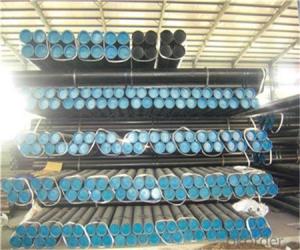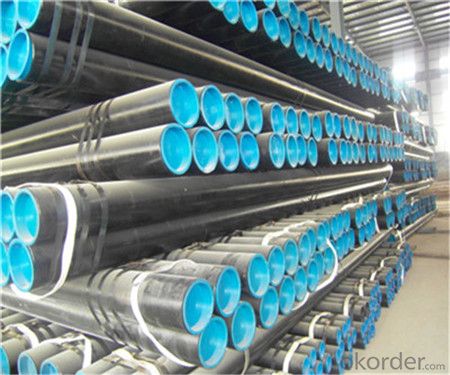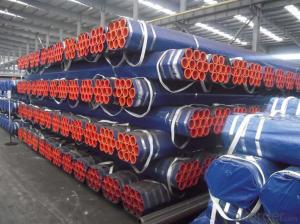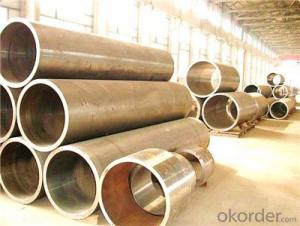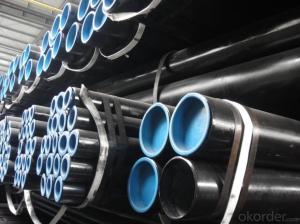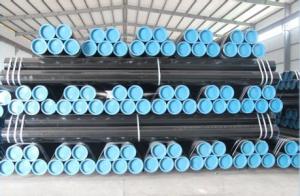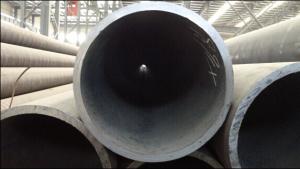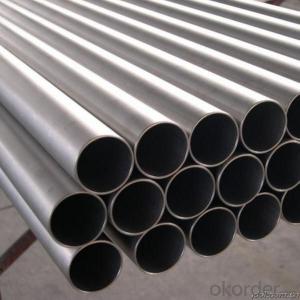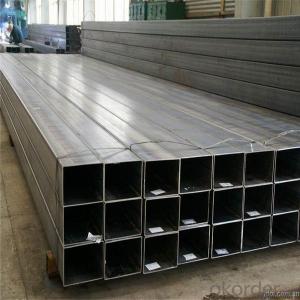Seamless Steel Pipe DIN17175/EN10216-2 China Supplier
- Loading Port:
- Tianjin
- Payment Terms:
- TT OR LC
- Min Order Qty:
- 20 m.t.
- Supply Capability:
- 9000 m.t./month
OKorder Service Pledge
OKorder Financial Service
You Might Also Like
Product Description:
1、Structure of Seamless Steel Pipe DIN17175/EN10216-2:
Seamless pipe is formed by drawing a solid billet over a piercing rod to create the hollow shell. As the manufacturing process does not include any welding, seamless pipes are perceived to be stronger and more reliable. Historically seamless pipe was regarded as withstanding pressure better than other types.
Standard: DIN17175/EN10216-2: Heat-resisting seamless steel tube for boiler
● Application: To be used for the manufacturing of boiler.
● Steel Grade: St35.8, St45.8, 15Mo3, 195GH, P235GH, P265GH, 20MnNb6, 16Mo3.
2、Main Features of Seamless Steel Pipe DIN17175/EN10216-2:
• High manufacturing accuracy
• High strength
• Small inertia resistance
• Strong heat dissipation ability
• Good visual effect
• Reasonable price
3、Seamless Steel Pipe DIN17175/EN10216-2Specification:
Standard | GB, DIN, ASTM ASTM A106-2006, ASTM A53-2007 |
Grade | 10#-45#, 16Mn 10#, 20#, 45#, 16Mn |
Thickness | 8 - 33 mm |
Section Shape | Round |
Outer Diameter | 133 - 219 mm |
Place of Origin | Shandong, China (Mainland) |
Secondary Or Not | Non-secondary |
Application | Hydraulic Pipe |
Technique | Cold Drawn |
Certification | API |
Surface Treatment | factory state or painted black |
Special Pipe | API Pipe |
Alloy Or Not | Non-alloy |
Length | 5-12M |
Outer Diameter | 21.3-610mm |
Grade | 20#, 45#, Q345, API J55, API K55, API L80, API N80, API P110, A53B |
Standard | ASME, ASTM |
1) Material:20#(ASTM A 106/A53 GRB.API5LGRB,GB),45#,16Mn,10#.
2) Specification range:OD:21.3-610mm,WT:6-70mm,length:6-12m or according to the requirement of clients.
3) Excutive standards:GB,ASME API5L.ASTM A 106/A53,Despite of the above standards,we can also supply seamless steel pipe with standard of DIN,JIS,and so on,and also develop new products according to the requirements of our clients!
4) Surface:black lacquered,varnish coating or galvanized.
5) Ends:Beveled or square cut,plastic capped,painted.
6) Packing:bundles wrapped with strong steel strip.
4、Packaging & Delivery
Packaging Details: | seaworthy package,bundles wrapped with strong steel strip |
Delivery Detail: | 15-30days after received 30%TT |
5、FAQ of Seamless Steel Pipe DIN17175/EN10216-2:
①How is the quality of your products?
Our products are manufactured strictly according to national and internaional standard, and we take a test
on every pipe before delivered out. If you want see our quality certifications and all kinds of testing report, please just ask us for it.
Guaranteed: If products’ quality don’t accord to discription as we give or the promise before you place order, we promise 100% refund.
②How about price
Yes, we are factory and be able to give you lowest price below market one, and we have a policy that “ for saving time and absolutely honest business attitude, we quote as lowest as possible for any customer, and discount can be given according to quantity”,if you like bargain and factory price is not low enough as you think, just don’t waste your time.Please trust the quotation we would give you, it is professional one.
③Why should you chose us?
Chose happens because of quality, then price, We can give you both.Additionally, we can also offer professional products inquiry, products knowledge train(for agents), smooth goods delivery, exellent customer solution proposals.Our service formula: good quality+good price+good service=customer’s trust
SGS test is available, customer inspection before shipping is welcome, third party inspection is no problem.
● Professional teams ensure a high efficiency of your purchase
▲ Professional sales team
▲ Professional engineering and technology team
▲ Professional exportation and contract processing/management team
▲ Professional cooperators and partners
6、Seamless Pipe DIN17175/EN10216-2 Images:
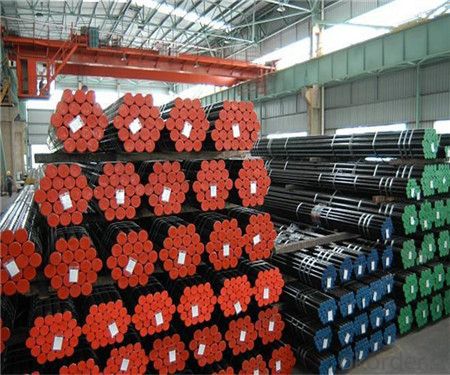
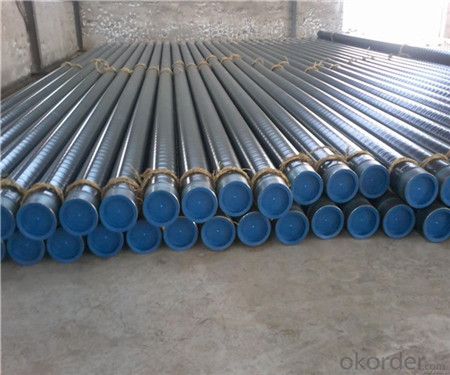
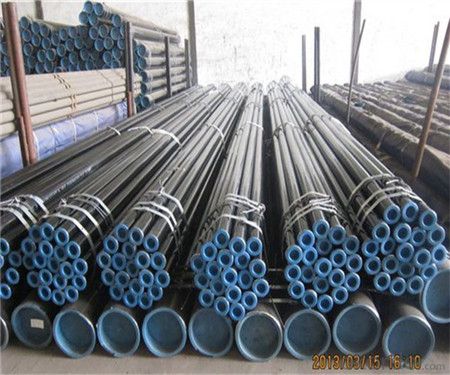
- Q: What are the different types of steel pipe fittings for industrial applications?
- There are several different types of steel pipe fittings commonly used in industrial applications. These include elbows, tees, couplings, unions, reducers, flanges, and caps. Each of these fittings serves a specific purpose in connecting and directing the flow of fluids or gases within a piping system.
- Q: How are steel pipes coated for protection against external elements?
- Steel pipes are coated for protection against external elements through a process called pipeline coating. This involves applying a layer of protective material, such as epoxy or polyethylene, onto the surface of the steel pipes. The coating acts as a barrier, preventing corrosion and damage from external factors like moisture, chemicals, and UV radiation. This protective coating ensures the longevity and durability of the steel pipes, even in harsh environments.
- Q: What is the difference between hot dip galvanized steel pipe and galvanized steel pipe?
- 1, the process is different, one is chemical treatment, one is physical treatment; hot-dip galvanized coating is reliable, not easy to fall off2, hot-dip galvanized coating thickness, so strong corrosion resistance. And zinc plating (electroplating) coating evenly, surface quality is better, coating thickness is generally between a few microns to more than ten microns.3 hot galvanizing is a chemical process, which belongs to electrochemical reaction. Zinc plating is a physical treatment, just brush a layer of zinc on the surface, there is no galvanizing inside, so the zinc layer is easy to fall off. Hot-dip galvanizing is used in building construction.4 、 hot galvanized pipe is to make molten metal and iron matrix reaction and produce alloy layer, so that the substrate and coating two combination.
- Q: Can steel pipes be used for shipbuilding?
- Yes, steel pipes can be used for shipbuilding. Steel is a commonly used material in the construction of ships due to its strength, durability, and resistance to corrosion. Steel pipes are used for various purposes in shipbuilding, including the construction of the ship's hull, superstructure, and various internal systems such as plumbing, ventilation, and fuel lines. The strength and structural integrity of steel pipes make them suitable for withstanding the harsh conditions at sea, such as high pressures, extreme temperatures, and exposure to saltwater. Additionally, steel pipes can be easily welded and shaped to meet the specific requirements of shipbuilding, making them a versatile choice for this industry.
- Q: What are the common methods for joining steel pipes?
- The common methods for joining steel pipes include welding, threading, and using mechanical connectors such as couplings or flanges.
- Q: How are steel pipes used in the construction of nuclear power plants?
- Steel pipes are used in the construction of nuclear power plants for various purposes, including transporting coolant, steam, and gases, as well as providing structural support for the overall system. These pipes are specifically designed to withstand high pressures, extreme temperatures, and corrosive environments, ensuring the safe and efficient operation of the nuclear power plant.
- Q: How do you calculate the pipe flow velocity for steel pipes?
- To determine the velocity of flow in steel pipes, two equations can be utilized: Manning's formula or the Darcy-Weisbach equation. 1. Manning's formula, commonly applied to open channel flow but also suitable for partially filled pipes, calculates velocity based on the pipe's hydraulic radius, slope, and Manning's roughness coefficient. The formula is as follows: Velocity (V) = (1.486/n) * (R^2/3) * (S^1/2) In this formula: - V represents the velocity - n denotes the Manning's roughness coefficient (obtainable from reference tables) - R signifies the hydraulic radius (cross-sectional area divided by wetted perimeter) - S indicates the slope of the energy grade line 2. The Darcy-Weisbach equation, widely used for pipe flow calculations, derives velocity from the pipe's diameter, roughness coefficient, and head loss due to friction. The equation is as follows: Velocity (V) = (2 * g * hL)^0.5 In this equation: - V represents the velocity - g stands for the acceleration due to gravity (approximately 9.81 m/s^2) - hL refers to the head loss caused by friction, which can be calculated using the Darcy-Weisbach equation: hL = (f * L * V^2) / (2 * g * D) In this equation: - f denotes the Darcy friction factor (dependent on the Reynolds number and pipe roughness) - L represents the length of the pipe - D indicates the diameter of the pipe Both formulas necessitate input parameters such as pipe dimensions, roughness coefficients, and slope. These parameters can be obtained from engineering references or pipe manufacturer specifications. It is essential to note that these formulas provide approximate values and may require iterations or adjustments for precise outcomes.
- Q: Can steel pipes be used for water treatment plants?
- Yes, steel pipes can be used for water treatment plants. Steel pipes are widely used in water treatment plants due to their high durability, strength, and resistance to corrosion. They can effectively handle the high pressure and flow requirements of water treatment processes. Additionally, steel pipes can be easily welded and joined, making them suitable for various applications within water treatment plants, such as transporting raw water, treating chemicals, and distributing treated water.
- Q: Welded and seamless steel pipe how to distinguish?
- Generally, careful observation, can see traces of the weld seam pipe, further is the determination of the polished incision, and then with the file can be seen there is no clear cut, interface traces with the file cleanup to remove when cutting was pasted interface.
- Q: What are the different types of steel pipe nipples?
- There are several different types of steel pipe nipples that are commonly used in various applications. These types include seamless, welded, threaded, and grooved steel pipe nipples. 1. Seamless steel pipe nipples: Seamless nipples are manufactured from a solid piece of steel without any seams or joints. This type of nipple is often preferred for high-pressure or critical applications due to its superior strength and reliability. Seamless nipples can be threaded or plain-ended, depending on the specific requirements. 2. Welded steel pipe nipples: Welded nipples are made by joining two or more pieces of steel together through welding. This type of nipple is commonly used in non-critical applications where high pressure is not a concern. Welded nipples are available in both threaded and plain-ended options. 3. Threaded steel pipe nipples: Threaded nipples have external threads at one or both ends, allowing them to be easily connected to other threaded fittings or pipes. These nipples are commonly used in plumbing, water supply systems, and other applications where a secure and leak-free connection is essential. Threaded nipples are available in various lengths and diameters to accommodate different requirements. 4. Grooved steel pipe nipples: Grooved nipples have a groove or indentation around the circumference of the nipple, which allows for easy installation using grooved couplings. This type of nipple is commonly used in fire protection systems, HVAC systems, and other applications where quick and efficient installation is necessary. Grooved nipples are available in various sizes and configurations to suit different piping systems. In summary, the different types of steel pipe nipples include seamless, welded, threaded, and grooved nipples. Each type has its own advantages and is suitable for specific applications. It is important to consider the specific requirements and conditions of the project before selecting the appropriate type of steel pipe nipple.
Send your message to us
Seamless Steel Pipe DIN17175/EN10216-2 China Supplier
- Loading Port:
- Tianjin
- Payment Terms:
- TT OR LC
- Min Order Qty:
- 20 m.t.
- Supply Capability:
- 9000 m.t./month
OKorder Service Pledge
OKorder Financial Service
Similar products
Hot products
Hot Searches
Related keywords
